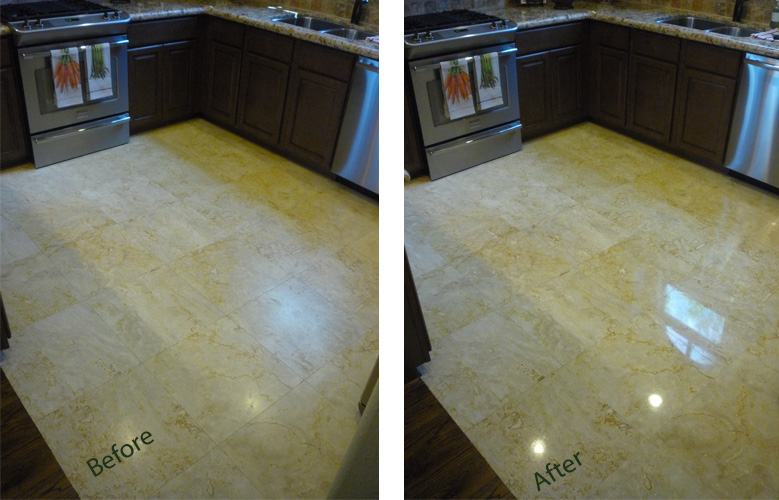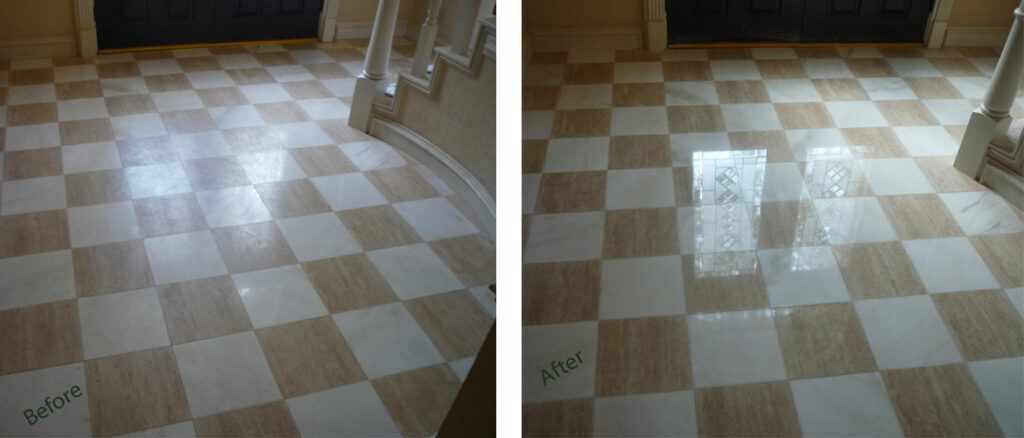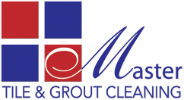There are several types of natural stones we see regularly. Here is a brief description of each and what types of services we can offer for it.
Travertine
Travertine is a type of limestone that can come in different styles. All limestone has “voids”. Think of swiss cheese. When that cheese is sliced, the slices have holes, right? Travertine is the same way. When the tiles are cut, they are full of holes and deep texture. These tiles are a calcium based stone that are susceptible to acid etching. Additionally, this stone is porous and therefore can be stained irreparably. Also, due to the stones soft nature, it is rather easy to scratch it.
Filled and honed
These types of tiles have had their “voids” filled on one side with a type of resin material. Then, the tiles are sanded (honed) so they have a nice smooth (but not shiny) finish. They make a beautifully unique floor. The grout is usually a non-sanded variety and the grout lines are usually very thin.
Tumbled
These types of tiles usually do not have their voids filled. This offers a more of the natural look than the filled and honed. This is also a very beautiful and unique floor, but it is certainly a challenge to keep clean.
We can do a simple 1-step restoration process or a multi-step process that will clean the tile and grout, correct etching and scratches, and polish the surface to a shine . We can also apply a penetrating sealer if desired.

Marble
Marble is another beautiful stone that comes in a variety of colors and patterns and is usually polished to a high shine. Unlike it’s cousin travertine/limestone, marble does not have “voids” (at least not very often). However, marble does share a couple of traits with travertine/limestone.
Marble is also a calcium based stone that is susceptible to etching. Marble is also easily scratched, and it is also porous leaving it susceptible to staining. The grout is usually a non-sanded variety and the grout lines are usually very thin. There is usually no texture on marble so wiping the tile clean is pretty easy.
We can do a simple 1-step restoration process or a multi-step process that will clean the tile and grout, correct etching and scratches, and polish the surface back to a shine . We can also apply a penetrating sealer if desired.

Slate
Slate makes for another beautifully unique floor. Slate is not a calcium based stone meaning you won’t hurt it if you spill lemon juice, vinegar, etc. That also means we can utilize our 2 step cleaning/restoration process that usually makes the grout look a little better than the single step we use on travertine and marble. Slate is porous and can stain and it can also be scratched. Slate is formed in layers and it is not uncommon to have a layer loosen and come off on a tile (or portion of). Slate is another tile that is a challenge to keep clean.
We can do the 1-step or 2-step restoration process on slate. We can also apply a penetrating sealer.
Bluestone
Bluestone has a very slate like look. In fact, many of our customers often confuse slate and bluestone. The bluestone we have restored is a smoother tile than slate and seems to be easier to clean than slate. Bluestone also does not fracture like slate.
We can do the 1-step or 2-step restoration process on bluestone. We can also apply a penetrating sealer.
